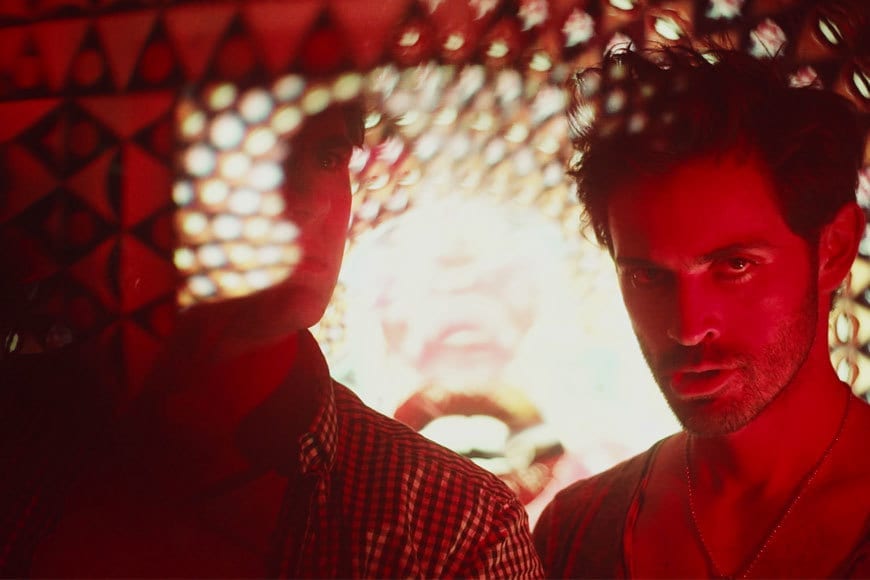To trip or not to trip thru Keta?
Anul acesta, la TIFF filmele selecţionate în categoria specială numită „A fi sau a nu fi corect politic?” candidează pentru premiul FIPRESCI. Trip cu Keta (El Viaje de Keta) este o producţie independentă din Mexic care prezintă provocările unei grăsuţe excentrice în căutarea unui job. Cu părul roz electrizant, tocuri înalte şi rochiţe oversized, este respinsă pe baza unor motive superficiale, care nu au legătură cu abilităţile necesare locului de muncă. În cele din urmă, un dealer de droguri consideră că poate fi potrivită să distribuie substanţe interzise pe străzile Mexicului. Comedia îndrăzneaţă a avut proiecţia la Cluj în premieră mondială.
Actor şi regizor, Julio Bekhor a venit la TIFF însoţit de unul dintre producătorii proiectului, Santiago Ortiz-Monasterio, unde au povestit despre misiunea dificilă a filmului şi reacţia neaşteptată a publicului român. (English below)
Este adevărat că „Trip cu Keta” a avut premiera mondială la TIFF?
Julio: Da, este adevărat. De fapt, a avut loc o proiecţie la festivalul mexican Morelia, dar a fost mai mult pentru presă, distribuţie, echipă şi câţiva prieteni apropiaţi.
Santiago: Dar nu a fost un eveniment oficial, deşi stafful festivalului ne-a oferit mai mult timp pentru proiecţii suplimentare. Ne-am dorit ca presa şi personalităţile din social media să ia contact cu povestea lui Keta. Vestea bună e că le-a plăcut foarte mult filmul, aşa că recomandările prin viu grai au fost pozitive.
Julio: Atunci l-am cunoscut pe Mihai (Chirilov, n.r.), căruia i-a plăcut filmul şi care ne‑a invitat să participăm la competiţie pentru premiul FIPRESCI.
Trailerul oficial este disponibil online? L-am căutat în 3 limbi şi nu am reuşit să-l găsesc.
Santiago: A existat un trailer, dar s-a spus că nu face dreptate filmului. De vreme ce întregul proiect nu este încă finalizat, încă suntem la ultimele etape ale post-producţiei. Aşadar, nu am avut nici timpul, şi nici banii pentru a finaliza trailerul potrivit.
Julio: Încă suntem în căutarea unei companii de distribuţie pentru a pregăti lansarea din Mexic.
Care sunt punctele tari ale filmului?
Julio: Avem o distribuţie grozavă, actori profesionişti, cu multă experienţă, cum ar fi „la novia de Mexico” (iubita Mexicului), Angelica Maria.
Santiago: Care a ieşit din zona de confort în acest film.
Julio: Toţi actorii dau viaţă unor personaje neobişnuite, care dezvăluie realitatea cotidiană din Mexic, precum şi o realitate pe care astăzi o găsim şi în alte locuri.

Cum a reacţionat publicul român la prima proiecţie de la TIFF?
Julio: Am avut mari emoţii, nu pentru că nu aş avea încredere în proiectul meu. Îmi iubesc filmul, l-aş putea urmări iar şi iar şi tot mi-ar plăcea la maximum. Sunt genul acela de persoană care, atunci când îi place un film, nu se plictiseşte să-l vadă de mai multe ori. În ce priveşte proiecţia de la TIFF, mi-am făcut griji cu privire la modul în care umorul negru şi gagurile aveau să fie traduse într-o altă limbă şi la modul în care avea să fie primit de publicul român. Oamenii au râs, au surprins de fapt mai multe detalii decât ne-am fi aşteptat. Mai mult, publicul a înţeles mesajul filmului nostru.
Santiago: Filmul prezintă două tipuri diferite de umor: limbajul comic universal, care va fi înţeles în orice cultură, şi comedia locală, de pildă glumele, accentele şi gesturile relevante pentru cultura mexicană, de care nu am făcut abuz. Deşi o scenă poate avea un înţeles destul de subtil, mesajul e foarte limpede. Umorul îşi păstrează limbajul universal, precum şi tema filmului, drogurile.
Filmul abordează chestiunea drogurilor. Aţi spune că le vorbeşte mai mult adulţilor sau tinerilor?
Julio: Ambelor grupuri. A fost o reacţie interesantă când am început să arătăm filmul diverselor persoane. Când producătoarea noastră, Monica Losano, care are în jur de 50 de ani, a văzut filmul pentru prima dată, a fost complet surprinsă: „Habar nu aveam că lucrurile acestea se întâmplă, deşi fiul meu e adolescent. Aşadar, filmul are o misiune educativă pentru mine, dar şi pentru copiii mei. Acum sunt conştientă că lucrurile acestea se întâmplă şi am un punct de plecare pentru conversaţiile cu fiul meu.”
Santiago: Având în vedere că atât adulţii, cât şi adolescenţii consumă droguri, problema nu ţine de vârstă. Cred că filmul le vorbeşte atâtor grupuri diferite încât mesajul are un caracter general. Indiferent de starea în care se află, mulţi oameni vor simţi că acest film le vorbeşte şi lor.
Filmul prezintă o fată pe nume Keta, cu părul roz, care poartă rochii oversized extravagante şi tocuri înalte şi care îşi caută un job. Este respinsă de mai multe ori din tot felul de motive învechite. Aţi spune că filmul vorbeşte despre modul în care societatea se aşteaptă să nu ne exprimăm personalitatea, să rămânem tradiţionalişti, să nu ieşim în evidenţă? Practic, Keta nu este primită cu braţele deschise în societate deoarece îşi exprimă personalitatea, îşi acceptă adevărata natură şi o arată tuturor, nu din cauza drogurilor.
(Râd amândoi) Julio: Tocmai ai descris povestea proiectului! Şi povestea lui Keta! Firul evenimentelor personajului traduce foarte bine ceea ce s-a întâmplat până acum cu filmul. Ce ai descris este exact ce se întâmplă cu proiectul nostru. Doar pentru că filmul este diferit şi arată lucrurile exact aşa cum sunt, a generat tot felul de reacţii.
Santiago: Există o luptă când vine vorba de sponsori, de ajutor din partea guvernului, al organizaţiilor de promovare a filmelor. Răspunsul lor a fost negativ, fiindcă filmul e despre droguri. Am primit ajutor guvernamental pentru distribuirea filmului în afara Mexicului, nu şi în reţeaua locală. Inclusiv Ambasada Mexicului în România ne-a oferit mult sprijin. Dar când vine vorba de finanţarea unui film despre o grasă care vinde droguri în Ciudad de Mexico, situaţia devine inconfortabilă. Chiar şi doi producători internaţionali de prezervative au refuzat să se implice în proiect ca sponsori. Principala problemă o reprezintă drogurile şi consumul. Toată nuditatea trece neobservată.
Julio: O doamnă din Spania a văzut filmul şi a spus doar: „Ce curaj!” (râde)
Santiago: Oamenii sunt surprinşi de modul în care filmul prezintă un subiect stigmatizat într-un mod foarte comic şi distractiv. Când întrebi un actor sau un scenarist ce e mai uşor de făcut, drama sau comedia, răspunsul va fi întotdeauna comedia. Există o linie fină între a face publicul să râdă sau să nu aibă nicio reacţie. Este mult mai greu să creezi o oră şi jumătate de comedie pură decât să provoci durere şi lacrimi timp de 3-10 minute într-o dramă. Să-i faci pe oameni să râdă e o artă.

Varianta interviului în limba engleză
Both director and actor in the film Tripping thru Keta, Julio Bekhor came to TIFF accompanied by one of the producers, Santiago Ortiz-Monasterio. They took their time to speak about their film’s mission and the unexpected way the Romanian public has received their film.
Is it true that “Tripping thru Keta” had the world premiere at TIFF?
Julio: Yes. It is true. Actually there was a screening at the Mexican festival called Morelia, but it was more for the press, the cast, the crew and some close friends.”
Santiago: But it was not an official event. Even though the festival staff had offered us more space for extra screenings. We were looking for the press and the Social Media figures to engage with Keta’s story. The good news is that they really enjoyed the film, so the word of mouth generated was a positive one.”
Julio: This is when we met Mihai (Chirilov, n.r.), he liked the film and invited us to participate at the competition for the FIPRESCI prize.
Is the official trailer of the film available online? I searched it in 3 different languages without finding it.
Santiago: There was one trailer, but people said it did not make justice to the film. Since the whole project is not yet done, we are still on the last steps of post-production. Therefore we haven’t had the time, nor the money to finish the right trailer.
Julio: We are still looking for a distribution company in order to prepare everything for the launch in Mexico.
Which are the hotspots of the film?
Julio: We count on a great cast, professional actors, with a lot of experience, like “la novia de Mexico” (Mexico’s sweetheart), Angelica Maria.”.
Santiago: She went out of her comfort zone in this film.
Julio: All the actors give life to unusual characters, that reveal the daily Mexican reality, and, even, a reality found anywhere nowadays.
How did the Romanian public react on the first screening at TIFF?
Julio: I was very nervous, not because I do not trust my project. I love my film, I could watch over and over and still enjoying it to the fullest. I am that kind of person that when I like a film, I never get bored of watching it repeatedly. Regarding the screening at TIFF, I was worried about the way the black humour, the gags would be translated to a different language and how will it be received by the Romanian audience. The people kept laughing, they actually caught more inside details than we had expected. Moreover, the public understood our film’s message.
Stantiago: The film shows two different types of humour: the universal comic language that will be understood in any culture and the local comedy, like jokes, winks, accents relevant for Mexican culture that were not overused. Even though there might be a rather subtle meaning to a scene, the message is crystal clear. The humour keeps its universal language, as well as the film’s theme, the drugs.
The film tackles the drug issue. Would you say it is talking more to the adults or the young people?
Julio: To both groups. There was an interested reaction when we started to show the film to different people. When our producer, Monica Losano, she is in her 50s, saw the film for the first time, she was totally surprised: “I had no idea this was happening, even though my son is a teenager. Therefore, the film has an educative mission, for me, as well as for my children. Now I am aware this things happen and I have a starting point in having a conversation with my son.”
Santiago: “Taking into account that both adults and teenagers consume drugs, this problem is not age-defined. I believe that the film talks for so many different groups that the message has a general touch. Regardless of the state they find themselves, many will feel this film speaks for them as well.”
The film shows a young girl named Keta, with pink hair, wearing big size flashy dresses and high heels, looking for a job. She keeps being rejected on obsolete reasons. Would you say the film talks about how society expects for people to not express themselves, to stay in line, not to stand out? Basically, Keta is not received with open arms in the society because she expresses herself, she accepts her true nature and shows it to everyone, not because of drugs.
(Both laughing) Julio: You just described the story of this project! And the story of Keta! The character’s thread of events translates very well what happened with the film so far. What you described is exactly what is happening with our project. Just because the film is different and she shows her true colours, it generated all types of reactions.”
Santiago: There is a struggle when it comes to sponsors, government help, film promoting organizations. Their response has been negative, since the film is about drugs. We have received governmental help with distributing the film outside Mexico, not so much in the local network. Including the Mexican Embassy in Romania has shown us great support. But when it comes to financing a film talking about a fatty selling drugs in Mexico City things get uncomfortable. Even two international condom manufacturers refused to be part of the project as sponsors. The main issue is the drugs and the consumption. All the nudity passes without notice.
Julio: A Spanish person saw the film and she just said: “What a courage!” (laughing)
Santiago: People are surprised by the way the film presents a stigmatized subject in a very comic and entertaining manner. When you ask an actor or a screenwriter what is easier between drama and comedy, the answer will always be the latter. There is a fine line between making the audience laugh or have no reaction at all. It is way more difficult to create one hour and half of pure comedy, than provoke pain and tears for 3 to 10 minutes in a drama. It’s an art to make people laugh.

All the images in this article were used with the aproval of Santiago Ortiz-Monasterio


















